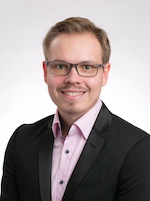The PhD defence will be digital, streamed directly using Zoom. The host of the session will moderate the technicalities while the chair of the defence will moderate the disputation.
Ex auditorio questions: the chair of the defence will invite the audience to ask questions ex auditorio at the end of the defence. If you would like to ask a question, click 'Raise hand' and wait to be unmuted.
-
Join the disputation
The webinar opens for participation just before the disputation starts, participants who join early will be put in a waiting room. -
-
Submit request to access (available from 11th of November 14:15 until 25th of November 14:15)
Trial lecture
25th of November, time: 13:15 pm, Zoom.
-
Join the trial lecture
The webinar opens for participation just before the trial lecture starts, participants who join early will be put in a waiting room.
Main research findings
This work explores the theoretical and practical ways of applying the successful class of artificial intelligence methods called 'neural networks' to the classical and important mathematical problem of filtering. Filtering is concerned with the question of how to extract an unknown signal from incomplete or corrupted observations and is important in applications, such as signal processing, engineering, and science.
Current state-of-the art methods to solve filtering problems have limitations, as the associated assumptions about the underlying signal are often not fulfilled in practice or additional methodologies are needed to handle problems with a large number of variables.
The work presented in this PhD thesis resulted in a working deep learning algorithm for the filtering problem and documents all stages of development. The theoretical feasibility of our algorithm is studied and justified by rigorous mathematical arguments. The method is implemented in computer code and validated using challenging filtering problems. Notably, our new method has been designed so that it is able to deal with incoming signals 'on the fly'. Moreover, contrary to many classical methods, ours avoids explicitly 'tiling' space. Therefore, it may potentially be developed into an alternative for the computation of real-world problems with a large number of variables.
Adjudication committee
- Associate Professor Samuel N. Cohen, University of Oxford
- Professor Josef Teichmann, ETH Zurich
- Associate Professor Håkon Hoel, University of Oslo
Supervisors
- Professor Salvador Ortiz-Latorre, University of Oslo
- Professor Dan O. Crisan, Imperial College London
Chair of defence
Head of Department Geir Dahl
Host of the session
Associate Professor Håkon Hoel
